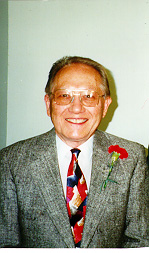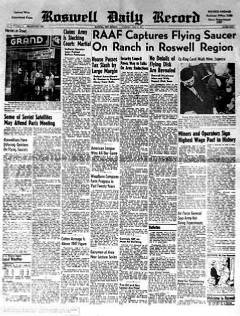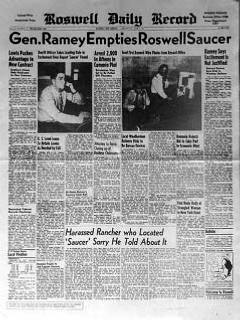

|
|
||||
Feature Articles: Alien Abductions, Cattle Mutilations, Conspiracies, Roswell, UFOsBiography of James Bond Johnson, Ph.D., Roswell Crash Photographer
James Bond Johnson, Ph.D. was incurably curious
all his life. This led to his becoming for five years a
reporter-photographer for the Fort Worth Star-Telegram
then the South's largest newspaper -- and to pursuing
university degrees in journalism, education, theology and
psychology at Texas Wesleyan, Texas Christian, Southern
Methodist and Claremont universities. He was a post
doctorate fellow of the National Institute of Mental
Health for three years of clinical psychiatry training in
the post-graduate Department of Psychiatry, University of
Southern California School of Medicine. He also received
clinical training at the U. S. Public Health Service
Hospital in Fort Worth, TCU-VA Veterans Guidance Center
in Fort Worth, Metropolitan Hospital in Norwalk, Tri-City
Mental Health Authority in Pomona, and Memorial Hospital
Medical Center of Long Beach. "Bond" as his friends call him, was an ordained United Methodist minister for
50 years and from 1960 was a California board
certified and licensed clinical psychologist. He was
in private practice as a clinical and consulting
psychologist in Long Beach for 39 years with specialties
in family therapy, sports and industrial psychology. In
1970, he founded the Long Beach Youth Home, a residential
treatment facility and school for emotionally troubled
youths, and in 1974 he established Cedar House in Long
Beach, which has become a national model in the treatment
of child and spousal abuse. He retired as senior
pastor of the First United Methodist Church of San Pedro. Bond pioneered in studying the etiology of
post-traumatic stress disorder, having interviewed
returned prisoners of war, escapees and evadees during
three wars. He served as an Army Air Corps pilot cadet in
World War II, a Marine Corps captain during the Korean
conflict and an Army psychological operations specialist
during the Vietnam War. Bond was a consultant to the
National Security Council at the White House. He served
on the Eisenhower Commission which revised the Code of
Conduct for prisoners of war and was a Pentagon
consultant to "Operation Homecoming," the
Department of Defense rehabilitation program for
returning prisoners of war after the Vietnam War. He was
on the consulting faculty of the US Army Command and
General Staff College at Fort Leavenworth, KS. Prior to
his retirement from the U. S. Army in the rank of full
colonel after 33 years of active and reserve service he
served as J-5 (civil military affairs)(Mob Des) for the
United States European Command. He served six terms as president of
the Los Alamitos Area chapter of The Retired Officers
Association and earlier served two terms as president of
the Long Beach area chapter. He was a life member of the
U. S. Marine Corps Combat Correspondents Association. An
inveterate traveler, he has organized and led group tours
to six continents in recent years, specializing in
"Sentimental Journeys" of former servicemen and
women (and widows) to American battlefields around the
world. Bond received notoriety in later life as the "Roswell Photographer"
responsible for photographing in 1947 the famous wreckage for the Fort Worth Star-Telegram the
wreckage of the controversial "UFO crash" at
Roswell, New Mexico. Bond was portrayed in this incident in
the movie "Roswell," produced by ShowTime. Bond succumbed to cancer at the age of 78. |
Alien Abduction Experience and Research
Copyright ©1996 - 2019. All Rights Reserved.


